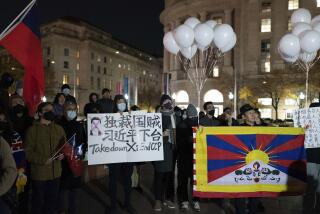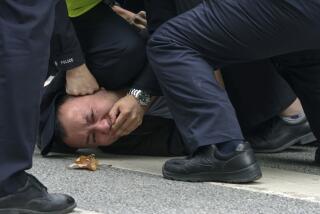Contradiction in Terms
- Share via
The passionate complaints about official corruption that were so much a part of last spring’s popular demonstrations in China have at last drawn a response from the top leaders of the Communist Party. The ruling Politburo has issued a statement denouncing graft, ordering public audits of a number of well-connected if dubiously managed trading firms, frowning on nepotism and announcing an end to some of the perquisites and privileges--special stores, imported cars, extensive foreign travel and the like--that have long been claimed by high officials. It sounds impressive. The trouble is that no new laws have been proposed to support this supposed get-tough approach. As with earlier anti-corruption campaigns, this one may well to turn out to be more talk than action.
That’s not surprising, given the universal fact that those who benefit most from the status quo are usually the least likely to want to change it. What the regime has to be aware of, though, is that an anti-corruption campaign that turns out to be a sham could have explosive consequences. Among the great revelations of the spring rebellion were how much is known publicly about official corruption, and how intensely resented are the graft and special privileges associated with the elite. Communism, after all, is supposed to be egalitarian when it comes to distributing goods and services, and nowhere are stories about the equality of hardship more an integral part of the communist legend than in China. Yet what the Yugoslav dissident Milovan Djilas more than 40 years ago described as a “new class” of Marxist oligarchs is very much in evidence in China. About all that can be said for now is that China’s new class has decided to be more discreet about appearances.
Appearances are important, of course, not least as they affect the regime’s already badly strained public credibility. The government now faces increasingly severe challenges as it tries to cope with an economy that is badly faltering. The economy was in trouble before the occupation of Tien An Minh Square; consumer shortages and inflation, in fact, did much to feed the rancor and demands of the spring demonstrations. The economy is in worse trouble now, as inflation and unemployment mount, as productivity falls, as foreign investment and tourism show no signs of returning to their pre-demonstration levels.
Last year, the government was forced to issue IOUs to pay for grain. The signs this year are that it will be able to pay peasants cash for only about half of their crops it buys. Suddenly, after years of extolling the charms of growing rich, the regime is lecturing its people about the pleasures of living frugally. Officials who are chauffeured in their imported cars to pick up luxury goods in stores closed to the general public are, of course, in no position to exhort people about the virtues of roughing it. China clearly needs the kind of campaign against official high-living and corruption that the Politburo has endorsed. Whether it will really get one is something else.
More to Read
Sign up for Essential California
The most important California stories and recommendations in your inbox every morning.
You may occasionally receive promotional content from the Los Angeles Times.












